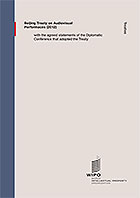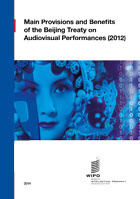The Beijing Treaty
The Beijing Treaty on Audiovisual Performances addresses the longstanding need to extend the economic and moral rights of actors and performers in audiovisual performances including films, videos and television programs.
Why do we need the Beijing Treaty?
Performers play a critical role in the audiovisual industry, but in many countries few or none of their intellectual property (IP) rights are recognized.
The protection of audiovisual performers' rights is particularly important in the online age as television programs, films and videos are increasingly being transmitted or made accessible across borders through digital channels.
Become a member of the Beijing Treaty
All WIPO member states, as well as the European Union, are eligible to become party to the Beijing Treaty. The Treaty will enter into force three months after 30 eligible parties have deposited their instruments of ratification or accession.
In order to become a member of the Beijing Treaty, a state must deposit an "instrument" of ratification or accession with the Director General of WIPO. This instrument must be signed by the national competent authority, according to each member state's national legislation – usually the Head of State, the Head of Government or the Minister of Foreign Affairs.
Legislative assistance

News
Notifications
Publications
Main Provisions and Benefits of the Beijing Treaty
PUBLICATION YEAR: 2016
Legal resources
Information resources
Diplomatic conference
- Diplomatic Conference on the Protection of Audiovisual Performances (June 2012, Beijing)



